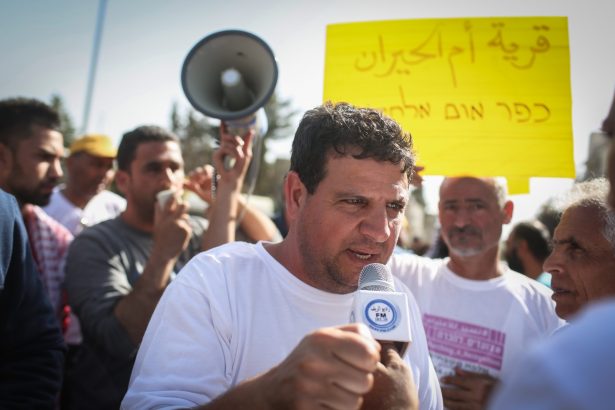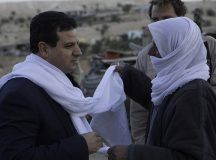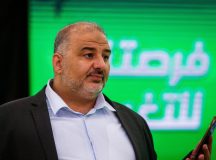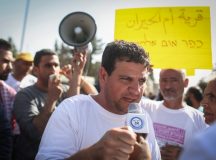What took Ayman Odeh, the young Arab politician who rose to prominence before the 2015 elections and was lauded as a moderate on a journey from championing cooperation to calling on Arab citizens to refuse to serve in Israel’s security forces? Fathom Deputy Editor Calev Ben-Dor maps out three distinct phases in Odeh’s political journey that may help explain this evolution.
‘Throw the weapons in their faces’
Ayman Odeh, the 47-year-old head of the predominantly Arab ‘Joint List’ party is no stranger to making waves. But the reactions to his comments outside Damascus Gate in April threaten to engulf him and undermine his political future.
In a Ramadan video posted on Facebook, Odeh said it was a humiliation for Arabs to join the security forces and called on those in the service to ‘throw the weapons in their faces’. A spokesperson later emphasised his remarks referred exclusively to those serving in the West Bank and East Jerusalem, as opposed to civilian police. But speaking to Channel 12, Odeh doubled down. Refusing to apologise, he extended his call to Jewish Israelis. ‘Don’t serve in the occupation forces, don’t kill,’ he said.
Odeh’s words were interpreted by most Israelis as telling Druze, Christian and Muslim Arabs to refuse to serve in defence forces in any capacity. It was particularly galling as it came against the backdrop of several terror attacks which – amongst others – caused the death of Christian policeman Amir Khoury and Druze border policeman Yezen Falah.
In a country where the right and left struggle to agree on anything, Odeh ‘merited’ wall to wall condemnation. One Likud MK pushed to suspend Odeh from the Knesset. Meretz member Yair Golan (himself no stranger to controversial comments) suggested Odeh’s words were a ‘grave mistake’ and ‘mainly hurt the public he is trying to represent’.
Odeh is a seasoned politician, and it’s difficult to imagine his incendiary words were not pre-planned and intentional. Odeh’s ‘choice of tone, timing and location’ wrote Haaretz political analyst Yossi Verter, ‘position him at the extremist fringe of Arab politics – more so than the nationalist Ta’al or the Islamic Movement. Maybe even more so than Balad, but in any case, certainly not very far from it.’ What stung even more was, as Verter points out, the speech came from someone whom ‘many tried for years to see as a moderate who could be a bridge between Jews and Arabs’.
The Political Evolution of Ayman Odeh
It doesn’t take a political expert to know that if an MK who views the Zionist left as potential allies manages to ‘lose’ Meretz, it’s a bad sign. What happened to Ayman Odeh, the young Arab politician who rose to prominence before the 2015 elections and was lauded as a moderate? What took him on a journey from championing cooperation to the steps of Damascus Gate. In order to answer this question, it’s worth viewing Odeh’s political career through three distinct phases.
Phase 1: 2015 – 2019: Fresh face emphasising Jewish-Arab cooperation
The first phase began prior to the 2015 elections, when Odeh was elected as Hadash’s new leader and was subsequently placed as head of the Joint List (which comprised Communist Hadash, Palestinian nationalist Balad, the Islamic United Arab List (UAL), also known as Ra’am, and Ahmad Tibi’s Arab nationalist Ta’al party). Odeh was seen as a fresh, pragmatic voice for the Arab community in Israel, who emphasised the need for Jews and Arabs to work together. In those elections – also infamous for Netanyahu’s false claim that Arabs were going to the polls in ‘droves’ – the Joint List won 13 seats.
Odeh became a poster boy for the Arab community in Israel. In January 2016, David Remnik ran a long and complimentary feature on Odeh in the New Yorker. That year, Israel’s The Marker ranked him in ninth for their top 100 most influential people. The one-word title they gave him was telling: The Mediator. ‘He is a moderate who knows how to listen to the Arab side while also knowing the way to the hearts of the Jewish sector’, the magazine stated. But it also furnished a warning note ‘politically Odeh has been less successful’ The Marker wrote. ‘Over the last year, Odeh has been surprised time and again by the MKs from the Balad faction who didn’t share their plans with him.’
It wasn’t long after that Fathom sat down with Odeh to understand his vision for Israel. Sitting in his Knesset office in April 2017, the leader of the Joint List was amiable if careful with his words. One priority was to convince the Zionist left that it would be impossible to make important changes without Arab parties. ‘If issues of peace, democracy and social justice are important to the centre-left’ Odeh explained, ‘they have to make us partners’. Odeh strove to bridge the two communities. ‘This belief that Jews and Arabs have shared interests allows me to build trust by speaking one politics but in two languages’ he said. ‘I want to advance this idea that the interests of Jews and Arabs don’t contradict one another.’
Odeh also spoke about leadership, especially in the context of what he had told Remnik. ‘I am not some intellectual hoping to be understood a century from now,’ Odeh had relayed to the New Yorker. ‘I’m a political leader. I have to stand in front of my community. If I am a metre too far out in front of the people, I’ll lose them.’
I was intrigued by how he understood his role as head of the now united Arab party in Israel, one with so many seats. ‘A leader should lead rather than be led’ Odeh began. ‘But there is a difference between a politician who thinks about the next election cycle and a leader who thinks of future generations. I don’t want to be right but irrelevant. The wisdom in leadership’ he suggested ‘is not to stay in the middle and let people pass you. But one also can’t be so far out in front that people don’t even see your back. The latter role is for the intellectual, who believes that in 50 years people will understand him and think he was right. A leader has to maintain the connection with his people’.
When asked whether he could imagine a scenario in which he would join a coalition government, Odeh was cautious. The furthest he would go (at that stage) was emphasising his wish to influence. He reiterated that many in Arab society saw the ‘Rabin era’ – when Arab parties provided a technical blocking majority to prevent the government from falling – as the best parliamentary period in the history of the state for Arabs.
Phase 2: 2019 – 2021: Odeh Crosses the Rubicon
If Odeh had previously dipped his toes into the waters of political cooperation with Zionist Jewish parties – checking the temperature to make sure he wouldn’t be scalded – things changed before the second of what would be Israel’s marathon rounds of elections. Less than a month before, in August 2019, Odeh sat down with leading Israeli journalist Nahum Barnea for an explosive interview. Using quotes from famous Israeli singer Arik Einstein, Odeh explained that he wanted to move Arab politics in Israel ‘from a position of protest to one of influence’. He even expressed willingness to support the government from outside and recommend Blue and White leader and former IDF Chief of Staff Benny Gantz as Prime Minister.
That interview gave rise to what consultant, researcher, and theorist Ameer Fakhoury termed Odeh-nism, in other words, ‘the founding moment in which Palestinian citizens of Israel demand to join and begin to actively pursue joining the political Israeli community’. True to his theory of politics and leadership, Odeh was in line with the Arab public. A 2019 poll by Sicha Mekomit had shown 87 per cent support for Arab parties entering governing coalitions. Another survey by the Konrad Adenauer Program for Jewish Arab Cooperation at the Moshe Dayan Centre in Tel Aviv University, found 46 per cent of respondents were happy to join any government, in contrast to 18 per cent who specified it only be a centre-left one (an additional 21.3 per cent supported the ‘Rabin era model’). Buoyed by renewed hope in influencing the establishment, Arab voters did indeed come to the polls in droves, delivering 13 seats for Odeh’s Joint List (one of those seats – approximately 30,000 votes – came from Jewish Israelis supporting the party).
It can be difficult to remember the centrality with which Odeh was viewed in the aftermath of the September 2019 elections. Following the final vote count, Odeh tweeted a quote from Psalms 118:22: ‘The stone which the builders rejected has become the chief cornerstone.’ The New York Times ran a headline quoting Odeh saying they were ending Netanyahu’s grip on power. The Washington Post asked whether Arab Israelis were having their political moment.
Odeh-nism was indeed revolutionary. But its core problem was that despite its leader being at the peak of his political power, Odeh was blocked or outmanoeuvred. Negotiations with Gantz broke down when two MKs from a right-wing faction within Blue and White vetoed the creation of a minority government with support from the Joint List outside the coalition. After the third elections, the Joint List gained another two seats. Negotiations on an array of issues progressed, and reportedly came close to a historic agreement. But Gantz ultimately joined Netanyahu in a unity government. Odeh and the Joint List had asked for and received the voters’ trust. But they were left with nothing to show for their Rubicon-crossing moment.
Momentum in support for the Joint List slowed, and the fourth elections brought a new Arab ‘kingmaker’ to the fore. Mansour Abbas, leader of the Islamist UAL had split from the Joint List, taking Odeh’s strategy and ‘upgrading’ it. Odeh-nism 2.0 didn’t limit itself to the left / centre-left of the political map as Odeh had. ‘I have not inherited incorrect political concepts based on dividing the ‘right’ and ‘left’ of the Israeli political map, as if the largest role we can expect is to be a reserve force for the so-called ‘Zionist left’ Abbas told supporters. Whereas Odeh limited himself to those Zionist parties who had similar positions on the occupation of the West Bank, Abbas had no such compunction. He downplayed the Palestinian issue, focusing instead on primarily socio-economic issues for Arab citizens of Israel. After flirting with Netanyahu, he ultimately joined the Bennett-Lapid government together with Labour, Meretz and others. Once again Odeh was left by the roadside with nothing.
Worse still was that his strategy had potentially facilitated Abbas’ move. ‘Odeh paved the path for Abbas’ Israel Democracy Institute’s Dr. Arik Rudnitzky told Fathom in the days after the fourth election. ‘Once a decision was made to move from a path of protest to one of influence – as Odeh proposed – it seems only natural to be willing to play the game properly and be open to supporting a right-wing government.’
Phase 3: 2021-2022 – Sitting bitterly in opposition
Before setting off for final-status negotiations with the Palestinians at Camp David, then-Prime Minister Ehud Barak said he felt like a trapeze artist about to jump into the air and unsure whether anyone would catch him or whether he’d fall into the abyss. While he’d likely abhor the comparison (they both would), Odeh’s move was similar. He jumped into the unknown, extending a hand to the Zionist left. But ended up falling. In the end, it was a rival, Mansour Abbas, who clipped the political coupon.
Which brings us back to the Damascus Gate steps in April 2022. In the background are three somewhat overlapping issues. Increased religious tension over the Temple Mount during Ramadan (which the year before had led to fighting between Israel and Hamas and returned the Palestinian issue to the international agenda); the general downplaying of the Palestinian issue by Mansour Abbas since joining the government; and Prime Minister Naftali Bennett’s increasingly shaky coalition, following Yamina MK Idit Silman’s decision to quit. With the Knesset in recess, numbers were startling: 60 for the coalition, 54 for the Netanyahu supporting opposition, and six MKs from Odeh’s Joint List. Those in Labour and Meretz have reportedly reached out to the Joint List to provide a parliamentary safety net. Odeh’s comments have now made this impossible.
‘Odeh wanted to differentiate himself from Abbas’, explained Mohammad Magadli, the first Arab analyst to become a regular commentator on a major Israeli news station. Speaking to the Israeli equivalent of the Daily podcast, Magadli argued Odeh’s statements could be directly connected to what happened after the elections. ‘Odeh took it personally. He felt betrayed and disappointed and that he had lost out both ways [by expressing willingness to join the coalition but ultimately staying in opposition]. He was fighting with those in his community who wanted no integration [with the Jewish establishment] on the one hand, but then lost out to Abbas who ultimately joined on the other.’
According to Magadli, Odeh actively sought to make himself a pariah to the Zionist left. ‘He wanted to take revenge on those he trusted but who ultimately rejected him. He didn’t want Labour and Meretz and others pressurising him to support the coalition. Perhaps if Abbas wasn’t already in the government’ Magadli mused, ‘Odeh would have tried once again to renegotiate entry’.
Based on this logic, Odeh was willing to weaken himself in the short term to potentially rehabilitate himself later. This strategy has two aspects. Weakening a government Odeh is not part of might undermine his main rival, Mansour Abbas. If elections were to take place before Abbas had something to show for his trouble, his party would lose popularity. Second, Odeh’s only route to political relevance is doubling down on the issue that Abbas has sought to downplay – the occupation. What better way of reminding the Arab public of Odeh’s bona-fide nationalist credentials than a provocative video outside the Old City during Ramadan?
Political commentator Afif Abu Much isn’t convinced that the Ramadan video served some well thought out strategic plan. But he tells Fathom that ‘just as the centre-left has adopted the Rak Lo Bibi (anyone but Bibi) slogan, the Joint List has adopted a strategy of Rak Lo Mansour (anyone but Mansour Abbas). Before the next elections,’ he adds, ‘Abbas will show strategy of being in the coalition and Odeh may try to present a strategy of protecting al Aqsa’.
Odeh’s dilemma also relates to the different publics and blocs he seeks to influence. He has four different interests to juggle: reaching out to the Jewish public, providing influence for the Arab public, winning the political quarrel with Mansour Abbas, and surviving the inner political machinations within the multi-faceted Joint List, some of whom are old school Communists or vocal Palestinian nationalists. It is this last group which is perhaps to blame for a series of unfortunate decisions by Odeh’s party – from refusing to criticise Assad to boycotting Shimon Peres’ funeral and Ukrainian President Zelensky’s Knesset address.
Through little fault of his own, Odeh failed to influence the first. He remained outside the government despite his Rubicon moment. He is struggling with the second. The Arab public is disappointed in him having voted for the Joint List assuming it would deliver influence. Polling by the aChord Center in December 2021 shows that 51 per cent believe the current government is dealing with issues important to Arab citizens with 24 per cent disagreeing. He is losing the third bloc, having been overtaken by Abbas for the ‘pragmatic’ mantle. And he is under pressure from within his own party who feel they are losing seats. Who does Odeh even represent? Religious Arabs will never vote for a secular universalist. Those eschewing integration won’t support him either. He is seemingly losing his constituencies from all sides. The aChord polling had Odeh coming in third in popularity (26.9 per cent) behind Mansour Abbas (28.4 per cent) and Ahmad Tibi (31.3 per cent).
Bad Ideology, Bad Politics
Perhaps Odeh felt he had no choice but to double down. I put this to Nimrod Nir, strategic consultant who worked with the Joint List in the past. Nir struggled to hide his disappointment with Odeh’s new direction, bemoaning his move from ‘flying the flag of inclusion and partnership to that of separatism’ and becoming a ‘prisoner of his own little Communist and separatist political mechanism’. ‘It’s clear that inner political pressure outranked the larger consideration [of cooperation] and frankly erased the amazing achievements that were done over the last few years’. As one of the relatively few Jewish voters for the Joint List, he bemoaned what he called Odeh’s ‘transition from a man who was strong and brave enough to go beyond political boundaries, knowing he had to talk to the widest possible Jewish and Arab publics, to a person who ultimately caved in to partisan pressures’.
Nir believes Odeh made an ideological and political mistake. ‘If you only believe in inclusion, cooperation, solidarity and finding the way we can share values when you thought it could serve you politically, and now suddenly you let go of all these messages and ideologies and go to these volatile places, then it wasn’t your true ideology’ he says. ‘If you really believe in inclusion and want to wave this flag it should be regardless of which kind of political benefits you receive.’
‘Even if one looks at this solely through a political lens’ Nir continues, ‘if this government advances true reforms in crime, infrastructure, education and budgets … and Odeh has the ability to be the safety net but refuses … the vast majority of his own public will not forgive him’. ‘If he played his cards right,’ Nir believes, ‘he could have become the kingmaker. Instead, he made himself irrelevant by a priori statements that turned him into an illegitimate partner’.
Israeli Politics and the ‘Arab Vote’
It remains to be seen how Odeh’s three stage political evolution will be greeted by his community at the next elections (which could come sooner than many imagined a month ago). Indeed, the competition between Zionist parties, the Joint List and Ra’am for the ‘Arab vote’ will continue apace, as will the debate over the best way for the community to influence government policy. Perceived success or failure for Mansour Abbas’ gamble of joining the coalition could change future voting patterns of how 20+ per cent of the population cast their ballot (or don’t as is often the case). Perhaps a new, Jewish-Arab political list will be established. Ironically when such an idea was broached in the past one politician suggested as potential leader was Ayman Odeh. It’s safe to say that ship has sailed.
In any event, those wishing to effectuate change will need political stamina. ‘Jews and Arabs have gone through decades of a very complicated relationship, and one needs to stick to a certain approach’ says Nir, ‘certainly give it more than 2 years. If things don’t happen, one can’t just go separatist’.
But perhaps stamina in the political realm isn’t always possible. Perhaps, Nir reflects, Odeh ‘can’t afford such stamina, because of his dependence on other political mechanisms within his party and society’. And isn’t this exactly what Odeh worried about to Fathom back in 2017. His main fear was becoming irrelevant. He knew there was a tension between the intellectual (who believes that in 50 years people will realise he was right) and the politician who is influenced by the election cycle. Odeh was clear: he couldn’t stray too far from his public. He must not be ‘so far out in front that people don’t even see your back’.
The sad irony is that, often through no fault of his own, having been left on the side-lines, and subsequently rejecting cooperation, Odeh now finds himself behind the Arab public he tried so hard to lead rather than ahead of it.





































